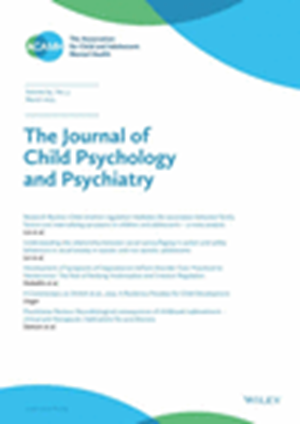儿童教育相关基因对母亲养育的唤起效应:来自挪威母亲、父亲和儿童队列研究的结果。
IF 7
1区 医学
Q1 PSYCHIATRY
引用次数: 0
摘要
长期以来,人们一直假设,随着年龄的增长,认知和教育表现的遗传性增加部分可归因于唤起性基因与环境的相关性。然而,这一假设尚未得到广泛的验证。方法:我们通过检查儿童教育多基因分数(PGSedu)是否与母亲在儿童5岁时自我报告的积极和以识字为中心的父母教养有关,以及在控制父母PGSedu的情况下,是否诱发了父母教养差异介导的遗传效应对儿童教育结果的影响(母亲在6-8岁时报告),来解决这一差距。我们还调查了母亲在5岁时对儿童语言的报告是否与父母教养和介导的遗传影响有关。这些问题在来自挪威母亲、父亲和儿童队列研究的83,627对父母-后代三人组的样本中得到了解决,这是一项基于纵向人群的妊娠队列研究。结果儿童的PGSedu与母亲的识字能力有显著相关(β =。03, 95% CI [0.01, 0.05], p = 0.021),而积极的父母教育(β = 0.01, 95% CI [-0.02, 0.05], p = .410)和以读写能力为中心的父母教育显著调节了儿童PGSedu对其学习成绩的影响(β = 0.01, 95% CI [1 × 10- 3,0.01], p = 0.023)。儿童语言与母亲教养相关,并介导儿童PGSedu对其学习成绩的影响(β = 0.01, 95% CI [3 × 10- 3,0.02], p = .002)。这些发现支持了我们的假设,并表明早期语言和父母教养可能是儿童遗传到其教育成果的途径中涉及的机制。本文章由计算机程序翻译,如有差异,请以英文原文为准。
Evocative effects of children's education-associated genetics on maternal parenting: results from the Norwegian mother, father and child cohort study.
BACKGROUND
It has long been hypothesized that increasing heritability with age of cognitive and educational performance is partly attributable to evocative gene-environment correlation. However, this hypothesis has not been widely tested.
METHODS
We addressed this gap by examining whether children's education polygenic scores (PGSedu) were associated with maternal self-reported positive and literacy-focused parenting when children were 5 years old, and if evoked parenting differences mediated genetic effects on children's educational outcomes (mother-reported at 6-8 years of age), while controlling for parental PGSedu. We also investigated whether maternal reports of children's language at 5 years old were associated with parenting and mediated genetic effects on educational performance. These questions were addressed in a sample of 83,627 parent-offspring trios from the Norwegian Mother, Father and Child Cohort Study, a longitudinal population-based pregnancy cohort.
RESULTS
Children's PGSedu were significantly associated with maternal literacy-focused (β = .03, 95% CI [0.01, 0.05], p = .021) but not positive parenting (β = 0.01, 95% CI [-0.02, 0.05], p = .410), and literacy-focused parenting significantly mediated the effects of children's PGSedu on their educational performance (β = 0.01, 95% CI [1 × 10-3, 0.01], p = .023). Children's language was associated with maternal parenting and mediated the effects of children's PGSedu on their educational performance (β = 0.01, 95% CI [3 × 10-3, 0.02], p = .002).
CONCLUSIONS
These findings support our hypotheses and suggest early language and parenting may be mechanisms implicated in the pathways from children's genetics to their educational outcomes.
求助全文
通过发布文献求助,成功后即可免费获取论文全文。
去求助
来源期刊
CiteScore
13.80
自引率
5.30%
发文量
169
审稿时长
1 months
期刊介绍:
The Journal of Child Psychology and Psychiatry (JCPP) is a highly regarded international publication that focuses on the fields of child and adolescent psychology and psychiatry. It is recognized for publishing top-tier, clinically relevant research across various disciplines related to these areas. JCPP has a broad global readership and covers a diverse range of topics, including:
Epidemiology: Studies on the prevalence and distribution of mental health issues in children and adolescents.
Diagnosis: Research on the identification and classification of childhood disorders.
Treatments: Psychotherapeutic and psychopharmacological interventions for child and adolescent mental health.
Behavior and Cognition: Studies on the behavioral and cognitive aspects of childhood disorders.
Neuroscience and Neurobiology: Research on the neural and biological underpinnings of child mental health.
Genetics: Genetic factors contributing to the development of childhood disorders.
JCPP serves as a platform for integrating empirical research, clinical studies, and high-quality reviews from diverse perspectives, theoretical viewpoints, and disciplines. This interdisciplinary approach is a key feature of the journal, as it fosters a comprehensive understanding of child and adolescent mental health.
The Journal of Child Psychology and Psychiatry is published 12 times a year and is affiliated with the Association for Child and Adolescent Mental Health (ACAMH), which supports the journal's mission to advance knowledge and practice in the field of child and adolescent mental health.

 求助内容:
求助内容: 应助结果提醒方式:
应助结果提醒方式:


